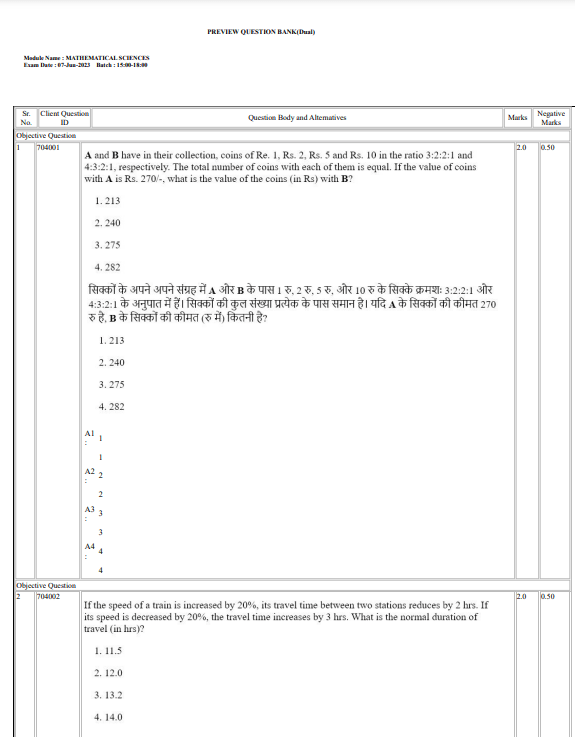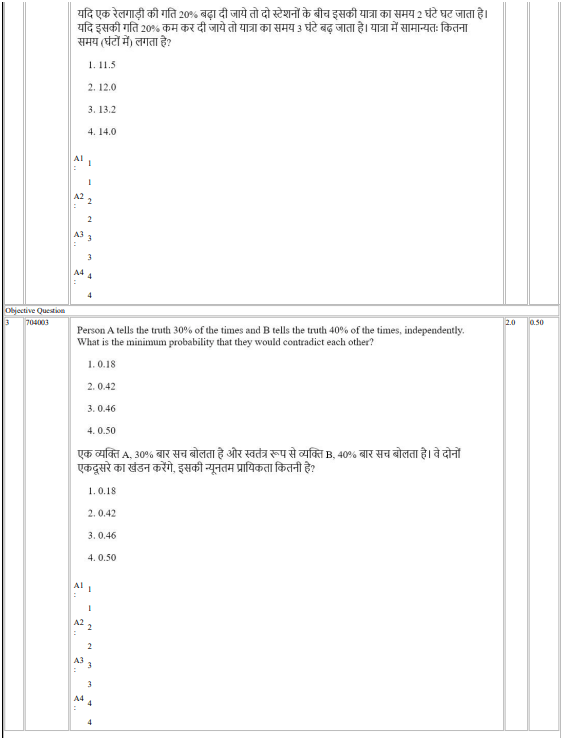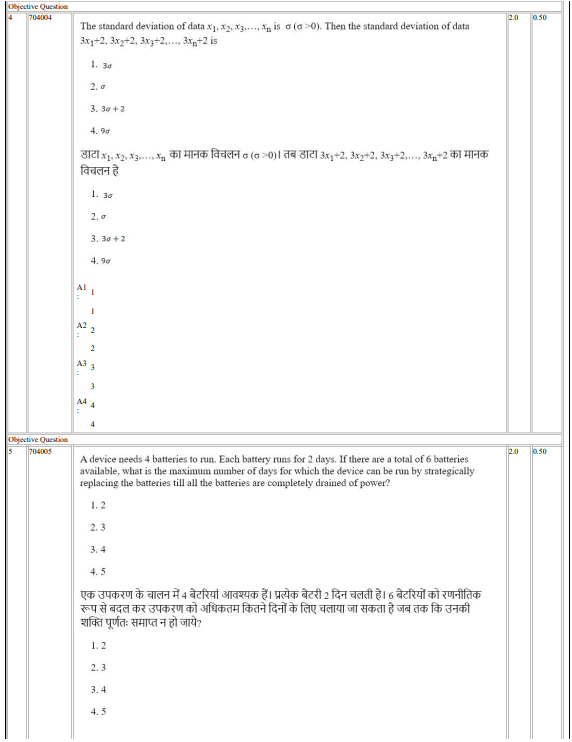CSIR NET Mathematics Question Paper : With the help of our website, which has an extensive collection of CSIR NET Previous Year Question Paper, you may successfully prepare for your CSIR NET exam. Get access to a large selection of past exam questions that have been carefully chosen to cover subjects related to the CSIR NET course. Download practice tests in several formats, such as multiple-choice questions (MCQs) and descriptive questions, to help you prepare for exams and increase your confidence. With the help of our platform, you can revise with concentrate and recognize important themes and question formulation trends. Get ongoing help and direction to help you prepare for and pass the CSIR NET exam.
- Introduction : CSIR NET Mathematics Question Paper
- Download : CSIR NET Mathematics Question Paper with Solution
- Syllabus : CSIR NET Mathematics Question Paper
- Exam Pattern : CSIR NET Mathematics Question Paper
- Significance of CSIR NET Mathematics Question Paper
- Tips for Good Preparation : CSIR NET Mathematics Question Paper
- FAQs : CSIR NET Mathematics Question Paper
Introduction : CSIR NET Mathematics Question Paper
Introduction to CSIR NET Exam
For junior studies fellowships (JRFs) and lectureships (LS) in a lot of scientific subjects, the Council of Scientific and Industrial Research National Eligibility Test, or CSIR NET, is a prestigious examination in India. It makes use of multiple-preference questions (MCQs) in areas inclusive of Chemical Sciences, Earth Sciences, Life Sciences, Mathematical Sciences, and Physical Sciences to assess candidates’ know-how. Promotes upgrades in medical studies and schooling throughout the kingdom and is conducted biannually by the National Testing Agency (NTA). It presents possibilities for research and coaching jobs in academia.
Purpose and Scope
CSIR NET is held for subjects such as Chemical Sciences, Earth Sciences, Life Sciences, Mathematical Sciences, and Physical Sciences. It serves as a crucial gateway for individuals aspiring to pursue research careers or academic positions in these disciplines.
Exam Structure
The exam consists of three parts: Part A, Part B, and Part C. Part A tests candidates on General Aptitude, while Part B and Part C assess their subject-specific knowledge through multiple-choice questions (MCQs).
Eligibility and Benefits
Candidates who qualify may be awarded a JRF, which enables them to pursue research in their chosen field, or LS, allowing them to pursue a career in teaching at universities and colleges across India.
Administration
CSIR NET is typically conducted biannually, usually in June and December, by the National Testing Agency (NTA) on behalf of CSIR. The exam follows a rigorous selection process and is highly competitive among aspiring researchers and educators in the scientific community.
Conclusion
For folks that need to pursue careers in math and statistics in India, the CSIR NET Mathematical Sciences check is a vital first step, offering access to lectureships and Junior Research Fellowships (JRFs). Examining each theoretical knowledge and sensible problem-solving abilities, the thorough assessment of mathematical capacity throughout diverse disciplines, along with calculus, algebra, evaluation, and records, is part of the technique. A candidate’s potential to make contributions to advanced research and coaching within the mathematical sciences is proven by way of their achievement within the CSIR NET, highlighting this system’s importance in forming careers and inspiring innovation in the area.
Download : CSIR NET Mathematics Question Paper with Solution
| CSIR NET Mathematics Question Paper | Download Link |
|---|---|
| CSIR NET Mathematics Question Paper 2023 | Download Here |
| CSIR NET Mathematics Question Paper 2022 | Download Here |
| CSIR NET Mathematics Question Paper 2021 | Download Here |
| CSIR NET Mathematics Question Paper 2020 | Download Here |
| CSIR NET Mathematics Question Paper 2019 | Download Here |



Syllabus : CSIR NET Mathematics Question Paper
The Life Sciences, Physical Sciences, Chemical Sciences, Earth Sciences, and Mathematical Sciences are the five disciplines that make up the CSIR NET Subject wise Syllabus 2024, which covers a wide range of topics. Aspirants pursuing research jobs in their various professions will find a comprehensive foundation provided by each topic, which explores particular areas of scientific inquiry.
Subject | Syllabus |
|---|---|
| Chemical Sciences |
|
| Earth Sciences |
|
| Life Sciences |
|
| Mathematical Sciences |
|
| Physical Sciences |
|
Exam Pattern : CSIR NET Mathematics Question Paper
- Three hours total for the exam Multiple-choice questions are the exam kind.
- There will be three sections to the test: Parts A, B, and C.
- Exam mode: solely computer-based testing (CBT).
| Category | Part A | Part B | Part C | Total |
|---|---|---|---|---|
| Total Questions | 20 | 40 | 60 | 120 |
| Max No of Questions to attempt | 15 | 35 | 25 | 75 |
| Marks for each correct answer | 2 | 2 | 4 | 200 |
| Negative marking | 0.5 | 0.5 | 1 | – |
| Category | Part A | Part B | Part C | Total |
|---|---|---|---|---|
| Total Questions | 20 | 50 | 80 | 150 |
| Max No of Questions to attempt | 15 | 35 | 25 | 75 |
| Marks for each correct answer | 2 | 2 | 4 | 200 |
| Negative marking | 0.5 | 0.5 | 1.32 | – |
| Category | Part A | Part B | Part C | Total |
|---|---|---|---|---|
| Total Questions | 20 | 50 | 75 | 145 |
| Max No of Questions to attempt | 15 | 35 | 25 | 75 |
| Marks for each correct answer | 2 | 2 | 4 | 200 |
| Negative marking | 0.5 | 0.5 | 1 | – |
| Category | Part A | Part B | Part C | Total |
|---|---|---|---|---|
| Total Questions | 20 | 40 | 60 | 120 |
| Max No of Questions to attempt | 15 | 25 | 20 | 60 |
| Marks for each correct answer | 2 | 3 | 4.75 | 200 |
| Negative marking | 0.5 | 0.75 | 0 | – |
| Category | Part A | Part B | Part C | Total |
|---|---|---|---|---|
| Total Questions | 20 | 25 | 30 | 75 |
| Max No of Questions to attempt | 15 | 20 | 20 | 55 |
| Marks for each correct answer | 2 | 3.5 | 5 | 200 |
| Negative marking | 0.5 | 0.875 | 1.25 | – |
Significance of CSIR NET Mathematics Question Paper
The significance of CSIR NET Mathematics Question Paper lies in their ability to serve as valuable study resources for candidates preparing for the CSIR NET examination. Here are some key reasons why these question papers are important:
Exam Blueprint Revealed:
The actual exam is modeled by these papers. You can learn a lot about the arrangement of the questions, the relative importance of the various areas on the syllabus, and even the degree of difficulty by carefully examining them. This enables you to customize your study and give priority to the subjects that need greater attention.
Improving Your Skills:
Using past year papers for practice is similar to taking practice exams in a real exam setting. You get to put your speed, accuracy, and conceptual understanding to the test in a virtual setting. This assists in determining your areas of strength and weakness prior to the exam, enabling you to improve your strategy and reinforce your comprehension of important subjects.
Building Exam Stamina:
The CSIR NET exam may have a time limit, therefore success depends on your ability to manage your time well. You can improve your endurance and time management abilities for the test by using previous year’s papers. You can learn to pace yourself, prioritize questions, and stay away from becoming bogged down on any one problem by practicing in a timed environment.
Increasing Confidence:
Completing last year’s papers successfully boosts your self-assurance and eases exam anxiety. Observing that you can appropriately respond to questions validates your understanding and inspires you to keep trying. Your overall exam performance is significantly impacted by this positive reinforcement.
Finding Recurring Patterns:
Although the precise questions won’t be asked again, reviewing previous exams frequently identifies patterns in the subjects and question types that are asked again. This enables you to create focused strategies for answering the kinds of questions you might encounter on the actual exam by anticipating their types.
It’s like having a secret weapon when you use the CSIR NET Mathematics Question Paper in your preparing approach. They sharpen your abilities, give you confidence boosts, and offer priceless insights, all of which considerably raise your chances of succeeding on test day.
Tips for Good Preparation : CSIR NET Mathematics Question Paper
Recognize the Test and Syllabus
Visit the official website to download the official announcement and syllabus. Understand the format of the exam, including the number of sections, weighted scores, and time allotment. Learn everything about the subjects included in the syllabus for each area.
Create a Timetable and Study Plan
Make a realistic study schedule with time allotted for each section based on the syllabus and your preferred learning method. Establish daily or weekly study times, and strive to maintain them. Be adaptable and make necessary changes to your plan, but consistency is essential.
Establish a Robust Base
Focus on the fundamental concepts in each area, especially in Child Development and Pedagogy. Learn the basic grammar rules for languages and important formulas and concepts in Mathematics and Environmental Studies.
Make Use of Educational Resources
Utilize top-notch study materials, such as textbooks, online courses, and coaching materials if necessary. Practice exam patterns and time management by reviewing previous year’s question papers and taking practice exams.
Consistent Practice
Complete practice questions from different sources daily. Prioritize accuracy while progressively increasing speed. Examine your errors and identify areas for improvement.
Master Core Subjects
Ensure a thorough understanding of the core subjects for CSIR NET, including Child Development and Pedagogy, Language I and II, Mathematics, Environmental Studies, and subject specialization for Paper II.
Prioritize Understanding
Focus on grasping the underlying principles rather than just memorizing information. This will help you tackle application-based questions more effectively.
Practice Frequently
Consistent practice is essential. Work through problems from reference books, practice exams, and previous years’ question papers. Analyze your mistakes and learn from them.
Concentrate on Time Management
Develop your time management skills during practice exams. Prioritize questions to ensure you don’t spend too much time on any single question.
Take Mock Exams Online
Taking online mock exams helps replicate the exam environment. This will increase your speed and confidence during the exam and help you identify your strengths and weaknesses.
Remember that success in the CSIR NET Mathematics Question Paper requires persistent effort, a planned strategy, and a positive outlook. Following these tips and working diligently can significantly improve your chances of passing this important exam.
FAQs : CSIR NET Mathematics Question Paper
Q. What is CSIR NET Mathematical Sciences?
A. CSIR NET (Council of Scientific and Industrial Research – National Eligibility Test) Mathematical Sciences is a national-level exam conducted to determine eligibility for lectureship and award of Junior Research Fellowship (JRF) in mathematical sciences in India.
Q. What are the eligibility criteria for CSIR NET Mathematics?
A.
For JRF: Candidates must have a Master’s degree in Chemistry or an equivalent degree with at least 55% marks (50% for SC/ST/OBC(NCL)/PwD).
For lectureship: The eligibility criteria are the same as for JRF.
Q. What is the exam pattern of CSIR NET Mathematics?
A.
- The exam consists of a single paper with multiple-choice questions (MCQs).
- The paper is divided into three parts: Part A, Part B, and Part C.
- Part A tests general aptitude and scientific knowledge of the candidate.
- Part B and Part C contain questions based on the subject-specific syllabus of chemical sciences.
Q. How can I apply for CSIR NET Mathematics?
A. Applications are accepted online through the official website of CSIR. Candidates need to fill out the application form, upload required documents, and pay the application fee.
Q. What is the syllabus for CSIR NET Mathematics?
A. The syllabus covers topics such as analysis, algebra, topology, differential equations, linear algebra, complex analysis, numerical analysis, and other advanced topics in mathematics.






